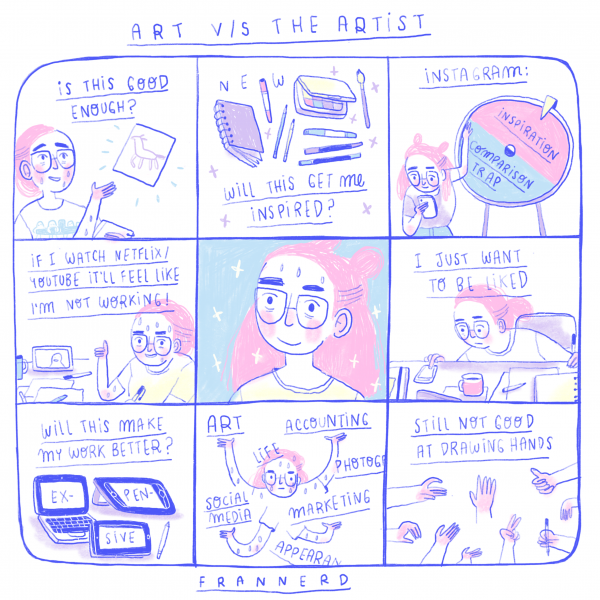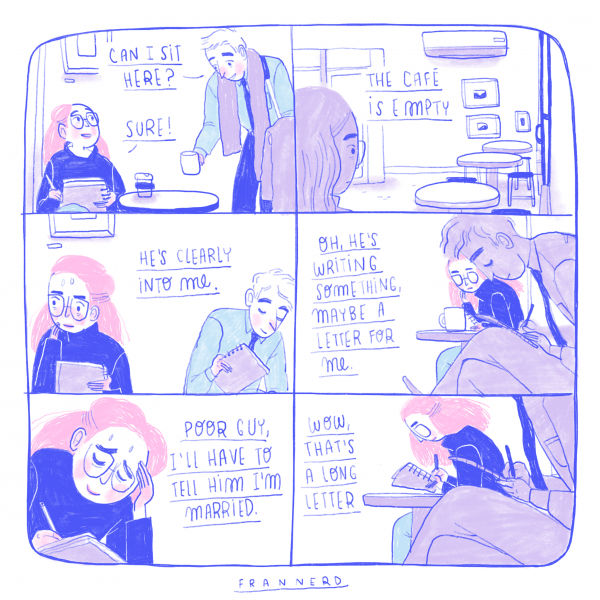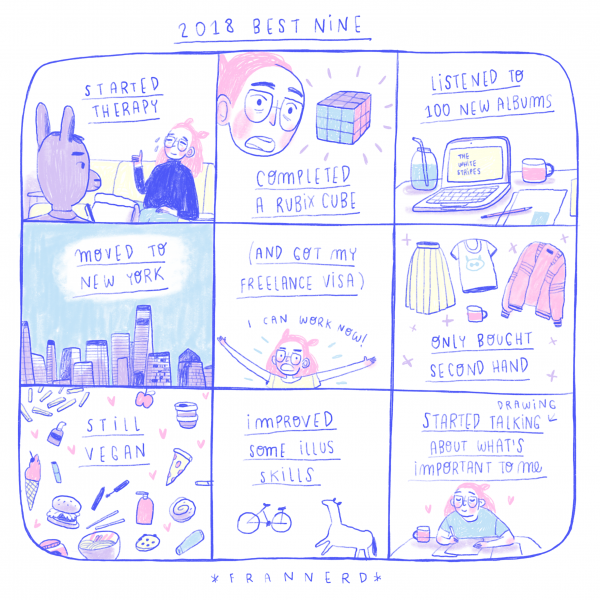Business Insights: Frannerd

Can you tell us a bit about yourself?
I studied graphic design in Santiago, Chile, and I did a couple of graphic designer jobs before going freelance full time. I learned everything about illustration myself – Reading books, blogs and trying to do my best with the little info available on the internet back in 2007, as I couldn’t afford workshops or classes.
Right now I’m working only on personal projects like my online shop, and I’m about to start my new graphic novel. I’m in the process of closing my Etsy shop and coding my own website and selling my own products (stationery, zines, self-published books), plus the illustrations and content I put online: Instagram, Youtube and Patreon.
A few years ago you took the decision to not take on any more client work, focussing solely on your audience and what you wanted to do. Was that a difficult choice to make – and how did you make it work?
YES, it was difficult mainly because, even though I knew there were people around probably doing the same thing, I didn’t know anyone at the time who just jumped into the void and went on their own path.
“I knew the formula was: If there’s enough people following me, I can make this work.”
I had a good chunk of sales during Christmas season, so my question was: “How can I have a steady amount of orders every month?”, and also: “Until then, and in between sales or lower months, how can I gain time to create/illustrate my own products/content/books?”
This is when Patreon came up. I was super critical about Patreon. At the time I wasn’t sure if I wanted a Patreon account (I saw creators disappear into the platform because of the load, or quit because they couldn’t keep up) so I did the research: Why were some accounts are successful? What’s the balance that truly works?
The rest I learned it along the way, while doing it. By month 2 I was already making enough on Patreon to be on my own, but it took me years to cultivate an audience willing to support me there (or on my shop).
I still accept (now, and back then, in 2016 when I opened my Patreon account) some commissions every now and then, for projects I really really want to be part of.
Your visual identity is very important – how did you build it?
I guess it happened with time and with lots of introspection. A couple of years ago I became obsessed with vulnerability (thank you Brene Brown) and I’ve always loved creating a connection with people.
All the illustrations or books or movies or albums that have resonated with me, it’s been because the content somehow talked or touched vulnerability in some way.
So I decided to open up about stuff: About me, about what I see. Social media is well known for always showing one side, the pretty perfect side. And I guess by being my most honest self, with flaws and all, it caught people’s attention. Sometimes it hurts, obviously. What you see it’s me, 100%, so when people attack me or troll me, they don’t attack a persona or a version of me: They attack me and my flaws and insecurities. It’s like a double-edge sword. I’d love to say “oh but I don’t mind, it’s part of life” but no, it really sucks. But oh boy it’s totally worth it.
When you share something meaningful to you it’s not only the most freeing feeling ever, but you also create a strong bond with someone else who will also relate with what you shared.

The online world is ever evolving – You’ve got a wicked Youtube channel, vibrant Instagram and Twitter pages, and an engaging Patreon. How you do you know what platforms work for you?
By trying – but also being super critical about them. When Twitch came up I was really, really suffering from FOMO (fear of missing out) cause I wanted to join in and do livestreams, but only because it was the new thing and people were doing it.
I thought “Man, if I already have so many social media platforms already open and active, could I keep up with ANOTHER one on top of everything?”, and also “Can I find what Twitch is offering me on another platform I already have?” (Answer: Yes, through Instagram!).
“I’ve always done pro-con list every time I decide to jump into something, so when I do something I have tons of research and stuff to back me up.”
Plus: When I really wanna do something, that desire usually overrules everything. So if you really, really wanna do something, and you can’t stop thinking about it and you wanna try a new platform, go for it baby! You only truly know once you’re in it.
Freelance income can be precarious. How do you manage your finances? How did you learn this?
I’m a very cautious person when it comes to money. I never buy something unless I really really need it (both a blessing and curse, cause I feel guilty and weird when I buy stuff).
I think everything changed when we moved to London and I decided to do “double down” on my shop and Patreon. I opened a business bank account to separate “business money” from “personal money”, and that was BY FAR the best decision I’ve ever made when it comes down to finances. I was suddenly aware of how much money my business was making, how much tax was I going to pay, and I made a small but significant distinction: “This money is not mine to spend, it’s my business’ money”.
I started thinking “Okay, how much of all of this can be my salary? I need to pay for the zines and stickers, can I pay myself £1000 every month?”
That was my goal in the beginning actually! With time I was really nervous to give myself a raise. I knew I was working my ass off, but I just had no idea when I was going to need more money for business stuff.
I started doing monthly spreadsheets (with coffee and biscuits, trying to make it as enjoyable as possible), so I became more aware of my expenses – How much money was coming in and out, every month.
So when you’re aware of your ins and outs, you’re more confident if you can give yourself a raise, or save, or invest on new equipment. “It’s September – I need money to print my stock for Christmas”, so I wasn’t scared of spending more money than usual during those months anymore: I knew it was a thing that happened every year because of my spreadsheets.
A year later, when I hired Jas, my assistant, I learned A LOT about holidays, salaries and sick days. I thought “Okay, I deserve 28 days of holiday in a year, I have to take those holidays too and take time off, I need to take care of myself”. I also gave myself a little raise for the first time (yay!).

How do look after your wellbeing?
“After being at the edge of burning out so many times, you learn it the hard way.”
So embarrassed to say this, by the way, cause I think part of being a professional (in any area) is to learn when to rest.
My problem is that I LOVE hard work. I LOVE to have a super productive day, but I learned it’s better to have a mega productive day from 9am to 4pm, than working half-ass 9am to 7pm and then having to catch up during the weekends.
This year I promised myself I was going to focus on less projects than last year and to work smartly (more intensely, but less hours) so I can focus on other things like hobbies. I haven’t had a hobby in…. I have never had a hobby, actually. I love what I do so much that I wanna do it every single hour I’m awake. So now I signed up for Japanese classes, and last year I spent one hour a day to learn how to complete a rubix cube.
I exercise as much as I can – When the weather is nice I go out for a run 3 times a week, but in colder weather I walk at least 30 minutes a day.
Top 3 tips for your peers?
- Do spreadsheets, I beg you. I know it’s more comfortable to not know your numbers – It’s scary, but it’s always better to know. Trust me! List all your expenses on one column and all your income(s) in another one. Extra brownie points if you have a separate bank account for your business expenses!
- Work more intensely/productively but for less hours. Use the Pomodoro method! We procrastinate because we’re tired, we can’t focus because we’re tired. It’s nice to have a life outside of what we do – It makes us feel motivated when we have to work. Have a hobby, rest, meet with people and exercise. Oh, and please stretch those hands!
- Be honest with who you’re and what you share/create. You don’t have to share all your flaws online or be vulnerable if you don’t want to! But be YOU, find your people by doing what you truly love. Honesty is so unique and rare nowadays, specially on the internet, but you know it’s there when you see it.
Back to News Page
